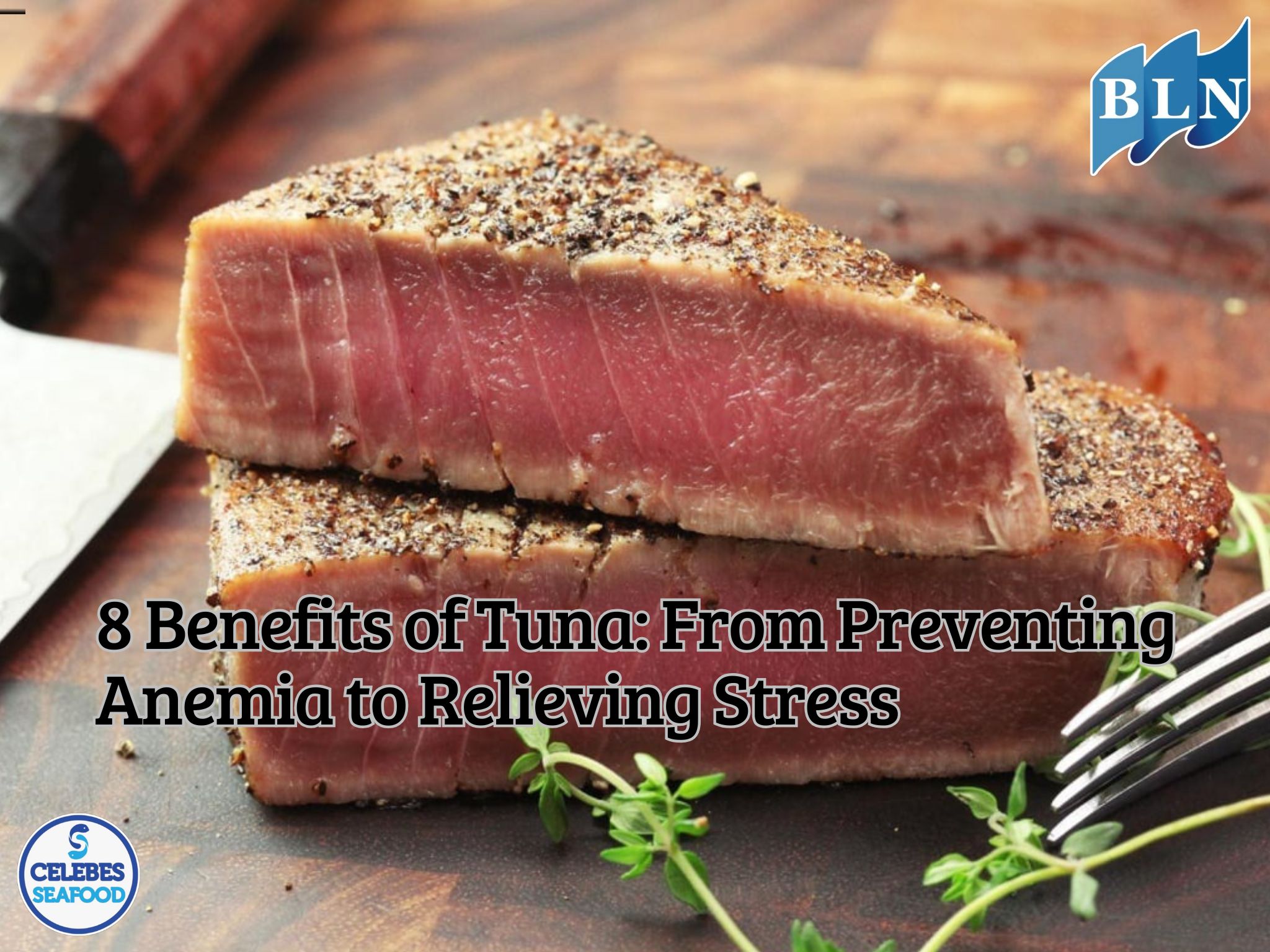8 Benefits of Tuna: From Preventing Anemia to Relieving Stress
By. Rani - 28 Jul 2025
lautnusantara.com Tuna is a popular fish because it's easy to prepare, has thick flesh, and boasts a savory flavor. Besides being delicious, many people are unaware that tuna offers numerous benefits. Read on to discover them.
Nutritional Content of Tuna
Tuna is often compared to salmon. Both fish frequently appear together in dishes like sushi.
Unlike salmon, which is orange, tuna has a bright red color. Fresh tuna tastes savory and is somewhat reminiscent of beef. This is why tuna is often called the "steak of the sea." Tuna is known for its high content of fat, protein, and omega-3 fatty acids.
Furthermore, consuming 100 grams of fresh tuna can provide your body with the following nutritional content:
-
Calories: 109 kcal
-
Protein: 24.4 grams (g)
-
Fat: 0.5 grams
-
Thiamine (Vitamin B1): 0.12 milligrams (mg)
-
Riboflavin (Vitamin B2): 0.12 mg
-
Niacin (Vitamin B3): 18.5 mg
-
Pantothenic Acid (Vitamin B5): 0.28 mg
-
Vitamin B6: 0.93 mg
-
Calcium: 4 mg
-
Iron: 0.77 mg
-
Magnesium: 35 mg
-
Phosphorus: 278 mg
-
Potassium: 441 mg
-
Sodium: 45 mg
-
Zinc: 0.37 mg
Health Benefits of Tuna
Whether fresh or canned, tuna offers many benefits for your body. Here are some of the advantages or benefits you can get from tuna.
1. Helps Meet Protein Needs
Tuna contains all types of amino acids that the body needs. Amino acids are the smallest molecules that make up protein. Any type of tuna you consume can provide a large amount of protein, specifically 24 – 30 grams of protein per 85 grams of tuna.
The complete protein from this fish supports various bodily functions well, from the formation of hormones, collagen, and antibodies, to the maintenance of your body's muscle tissue.
2. Promotes Heart Health
Tuna contains omega-3 fatty acids in the form of EPA and DHA, which can prevent inflammation in the body and reduce the risk of heart disease or stroke. If you want to gain the heart benefits of tuna, it's best to consume this fish 1 – 2 servings per week.
3. Potentially Prevents Anemia
Tuna is rich in Vitamin B6, especially the yellowfin and albacore varieties. The Vitamin B6 obtained from this red-fleshed fish contributes to various important body functions. One of these is helping to increase the production of hemoglobin, which is the protein that binds and carries oxygen in blood cells to all body tissues. Without sufficient oxygen supply, tissue function will decrease, making the body feel weak and easily tired. These are the main symptoms of anemia.
4. Helps Alleviate Stress
Indirectly, tuna also provides benefits for your psychological well-being. This is because one of the functions of Vitamin B6 is to maintain the function of brain and nerve cells. Additionally, Vitamin B6 increases the production of serotonin and norepinephrine hormones. Both of these hormones play a significant role in managing stress. Serotonin is a hormone that stabilizes mood and induces feelings of happiness, while norepinephrine influences thinking ability and feelings of well-being.
5. Maintains Bone Health
In 85 grams of tuna, there are approximately 185 – 265 mg of phosphorus, depending on the type of tuna consumed. Phosphorus is one of the important minerals whose primary function is for the growth and repair of body cells and tissues. About 85% of the phosphorus in your body is found in bones and teeth. Together with calcium, phosphorus forms bone structure and maintains its strength.
6. Aids Weight Loss
Another benefit of tuna is that it helps with weight loss. This is because this type of fish contains a small number of calories. Tuna is also high in protein, which can make you feel full longer and prevent overeating. The omega-3 fatty acid content in tuna also helps increase the metabolic rate, which can contribute to weight loss.
7. Maintains Eye Health
Regularly consuming tuna can also help maintain eye health. This benefit comes from its omega-3 fatty acid content. Quoting Mayo Clinic, omega-3 fatty acids can improve the oil layer in the eyes to help alleviate dry eyes. However, researchers state that further studies are needed to prove the efficacy of tuna in treating dry eye problems.
8. Boosts Brain Function
The benefits of omega-3 in tuna can also support brain function and thinking ability. A study in the journal Cureus revealed that omega-3 fatty acids may potentially help improve memory. Omega-3 is known to increase blood flow in the brain, which can support better thinking processes and decision-making.
Considerations Before Consuming Tuna
While tuna offers benefits for various bodily functions, it is recommended not to overconsume it. This is because tuna is one of the foods that contain mercury. Large amounts of mercury can harm the nervous system, so you need to limit your intake.
To be safer, it's best to limit your tuna portion to no more than 170 grams per week. This way, you can still get the nutritional content of tuna without unwanted side effects.
If reactions such as itching, rash, and swelling occur, immediately stop consuming the fish and take allergy medication. Consult a doctor if symptoms persist after a few days.
If you are interested in our GOAT FISH BUTTERFLY HEAD ON, GOAT FISH BUTTERFLY SKIN ON please do not hesitate to contact us through email and/or whatsapp.


.jpg)

.png)


